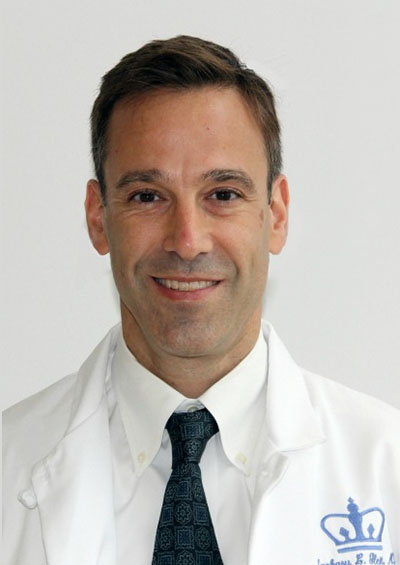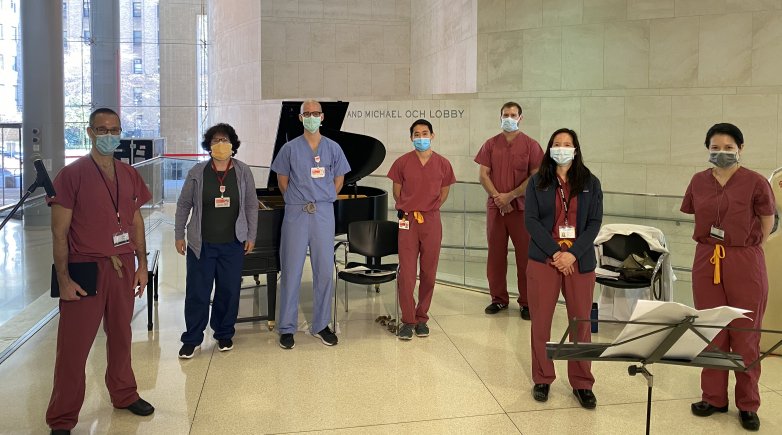On the front lines with Dr. Zachary Gleit ’83
New York City surgeon has answered the call to fight COVID-19 in the epicenter of the outbreak.
Dr. Zachary Gleit '83 (far left) and his New York-Presbyterian Hospital colleagues organized and performed a "healing concert" recently in the hospital's lobby.
As of late April, there were more than 270,000 confirmed cases of COVID-19 in New York — the most of any state in the nation. Dr. Zachary Gleit ’83 is among the scores of doctors who have been redeployed to intensive care units as hospitals adapt to meet present patient needs.
An assistant professor of surgery at Columbia University Medical Center and director of surgery at New York-Presbyterian/The Allen Hospital, Dr. Gleit usually specializes in hernia repair, gall bladder surgery and appendectomies. Now he’s part of New York-Presbyterian’s SWAT, or surgical workforce access team, working night shifts and performing tasks he hasn’t since he was a resident 20 years ago. “I feel overwhelmed by the responsibility and change in role,” he shared on a recent Facebook post.
We asked Dr. Gleit over Zoom, in between rounds, to tell us more about what it’s like to be a medical caregiver during a global pandemic.
Stepping up
Caring for patients
“It’s an emotional thing. Most of what I used to do on a day-to-day basis wasn’t life and death. It’s been a new experience to see these patients who are really at death’s door. It’s more shocking especially because they have nobody with them. The hospital has not allowed visitation since this all began more than a month ago. It’s shocking seeing these patients on ventilators or who are not yet so sick that they have to be sedated and who are going through a really scary time in their lives and there’s nobody that can be around them other than us, other than the docs and the nurses.”
Healing concert
“[The group photo] was taken recently during the Healing Concert we organized at the hospital (I’m the guy standing with the iPad on the left). I played the piano poorly as part of the concert. It was a concert played mostly by surgeons in the lobby of the hospital. It was recorded and has been played in patient rooms since on the hospital TV channel.”
Learning to adapt
“I’m 55, so it’s nice to see that I can relearn things that I learned in the past. Again, things like tracheostomies are things I haven’t done in several years. Lines are something I really haven’t done since I was a resident in 1998. That’s more than 20 years ago. Even being in an ICU attending is a new again experience in that it’s something that I learned in the ’90s. It’s great to rekindle that and to strengthen that knowledge base that I think I had gotten away from a bit. It’s good to know that I’m capable of doing that.”
The midnight scream
“At Exeter, the midnight before any vacation, everybody would open up their windows and scream. Officially, if the faculty caught you doing it, you could be disciplined or something. But it’s exactly the same kind of thing in New York right now. It’s not at midnight, but every day at 7 p.m. people shout out their windows and bang on pots and honk their horns and the dogs get involved barking. They say it’s to thank healthcare workers, which I appreciate and is great and is a reminder every day, but I think it’s also just a way to vent, right?”
